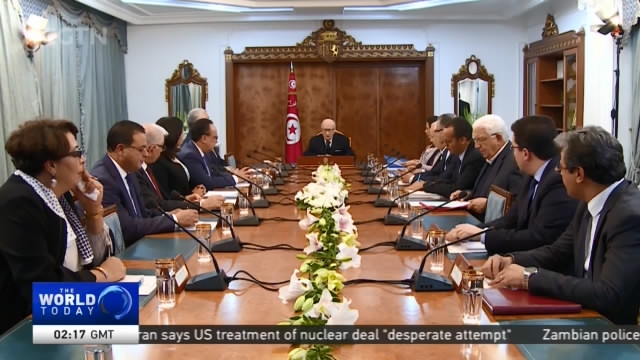
11:43, 13-Jan-2018
Tunisia Elections: Nidaa Tounes party pulls out of ruling coalition before polls

In Tunisia, political alliances are shifting ahead of local elections in May. In 2014, President Essebsi's former party entered a coalition government to help stabilise the war-torn country. But that alliance has split ahead of the upcoming elections. CGTN's Adnen Chaouachi breaks it down for us.
After 3 years of political alliance between Tunisia's two ruling parties, Nidaa Tounes decided to distance itself from the Ennhadha Islamic party.
ADNEN CHAOUACHI TUNIS, TUNISIA "Following 2014 legislative elections, Nidaa Tounes won the majority in parliament with 86 seats. The secular party could not rule alone because Ennahdha Islamic movement won 69 seats. Therefore, the country's most powerful political currents had reached a consensus. They agreed to form a coalition that would guarantee political and social stability in the country."
Nidaa Tounes claims that it does not share a common project with its former ally.
HASSEN LAAMERI NIDAA TOUNES MP, TUNISIA "The decision was taken by the party's central and regional bureaus. Now what unites us is the 'Carthage Agreement' which stipulates that all parties work together for the public interest. Otherwise, we don't share the same vision."
The Ennahdha block insisted on dialogue at parliament with Nidaa Tounes. The 2 parliamentary blocks are the main supporters of the government of Prime Minister Youssef Chahed.
IMED KHEMIRI ENNAHDHA MP, TUNISIA "It is impossible to adopt any draft law without a prior coordination between our two parties. The government needs our backing to work. We might disagree on many issues but we must support the government."
Analysts believe that breaking the alliance between the ruling parties is the first step in the local elections campaign.
SARHANE CHIKHAOUI JOURNALIST, AL-CHOUROUK DAILY "The so-called divorce between the secular and the Islamic party is a political maneuver. The local elections will be held in five months. The campaign has kicked off. The former allies are now adversaries. They are competing for seats in Tunisia's municipalities."
A few days ago, the Tunisian president gathered in Carthage palace the leaders of 8 political parties as well as the powerful organizations and unions. Béji Caid Essebsi urged them to work together and to put the political quarrels aside in order to focus on reviving the economy. However, the president's call was not heard from the political elite in the North African state. AC. CGTN. Tunis, Tunisia.

SITEMAP
Copyright © 2018 CGTN. Beijing ICP prepared NO.16065310-3
Copyright © 2018 CGTN. Beijing ICP prepared NO.16065310-3